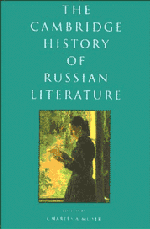Book contents
- Frontmatter
- 1 The literature of old Russia, 988–1730
- 2 The eighteenth century: neoclassicism and the Enlightenment, 1730–90
- 3 The transition to the modern age: sentimentalism and preromanticism, 1790–1820
- 4 The nineteenth century: romanticism, 1820–40
- 5 The nineteenth century: the natural school and its aftermath, 1840–55
- 6 The nineteenth century: the age of realism, 1855–80
- 7 The nineteenth century: between realism and modernism, 1880–95
- 8 Turn of a century: modernism, 1895–1925
- 9 The twentieth century: the era of socialist realism, 1925–53
- 10 The twentieth century: in search of new ways, 1953–80
- 11 Afterword: Russian literature in the 1980s
- Bibliography
11 - Afterword: Russian literature in the 1980s
Published online by Cambridge University Press: 28 March 2008
- Frontmatter
- 1 The literature of old Russia, 988–1730
- 2 The eighteenth century: neoclassicism and the Enlightenment, 1730–90
- 3 The transition to the modern age: sentimentalism and preromanticism, 1790–1820
- 4 The nineteenth century: romanticism, 1820–40
- 5 The nineteenth century: the natural school and its aftermath, 1840–55
- 6 The nineteenth century: the age of realism, 1855–80
- 7 The nineteenth century: between realism and modernism, 1880–95
- 8 Turn of a century: modernism, 1895–1925
- 9 The twentieth century: the era of socialist realism, 1925–53
- 10 The twentieth century: in search of new ways, 1953–80
- 11 Afterword: Russian literature in the 1980s
- Bibliography
Summary
The decade of the 1980s divides neatly into two equal halves. Over the first half hung the shadow of the gloomy “period of stagnation” which is rightly associated with the name of Leonid Brezhnev, one of the most dull-witted and predatory political figures of this century.
Brezhnev wanted to be a writer. In 1978–79 he published his auto-biographical sketches Malaya zemlya (the name given to a portion of the Kerch Peninsula, scene of fierce fighting during World War II, where Brezhnev was a political commissar), Rebirth (Vozrozhdenie), and Virgin Lands (Tselina). Although they were nothing more than brochures written in bureaucratese by ghostwriters, Brezhnev was immediately honored with a Lenin Prize, the highest Soviet literary award. Moreover, the literary journals and papers in Russia outdid one another in extolling the author of this “trilogy,” holding up his talent as an example for all, exclaiming over his brilliant metaphors, his vivid epithets and similes, and his lively dialogue. Moscow and Leningrad writers would gather for solemn discussions of the Brezhnev “trilogy” in obedience to party command.
Is it any wonder that so-called “secretarial literature” flourished luxuriantly at precisely this time? If everybody agreed that the country’s leading writer was the incredibly mediocre and perhaps even only semi-literate General Secretary of the party Central Committee, then what was to prevent the various Secretaries of the Union of Soviet Writers from publishing their writings in multi-volume editions? To be sure, Brezhnev exercised such unlimited power that he could award himself a Lenin prize, while the secretaries of the Writers Union could not do as much – but still they controlled such publishing houses as “Soviet Writer,” “Artistic Literature,” and “Young Guard.”
- Type
- Chapter
- Information
- The Cambridge History of Russian Literature , pp. 595 - 614Publisher: Cambridge University PressPrint publication year: 1992

